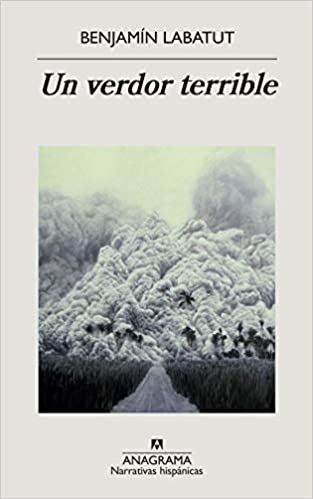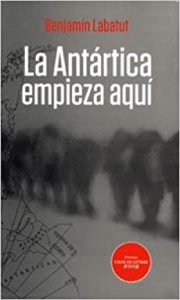As much as the purists of any field try, the best way to win over the laymen of an art is the approximation and the miscegenation. Although there is certainly also some narcissistic enjoyment in not disclosing certain privileges be it the fallen of the mushroom pickers or the scholarly glee of thought as rambling or transcendence ...
Benjamin Labatut it is that privilege made literature. And thanks to his approaches to fiction we can enjoy that thoughtfully gifted for the essay. Once the powerful outburst of his mixed-race prose has exploded in the epicenter of the world publishing market, surely we will be able to continue enjoying editions of previous works as well as the new that this boy with a privileged imagination is giving birth.
With its evocative narrative of the Boris vian more pretentious and at the same time clairvoyant, Labatut does good metaphysics. Essential philosophy that we all sense nested somewhere in the soul, like an ancient legacy entangled in spirals of DNA. There where our intelligence was awakened losing instructions and answers ...
Top 3 recommended books by Benjamin Labatut
A terrible greenery
The popularizers strive to find that balance capable of being sustained to load on one side the most sensible principles and on the other the most average understanding of the human being. The result tends to leak almost always to end up being technical readings.
Perhaps the question is not trying to put yourself in the place of the other when writing about science. The solution may be to begin by explaining well that only by letting yourself be carried away by the imagination can you avoid the formulas to enter the processes. As in history when something important is about to be discovered.
The narratives included in this unique and fascinating book have a common thread that intertwines them: science, with its searches, attempts, experiments and hypotheses, and the changes that - for better and for worse - it introduces in the world and in our vision of he.
Through these pages run real discoveries that form a long disturbing chain: the first modern synthetic pigment, Prussian blue, created in the XNUMXth century thanks to an alchemist who sought the Elixir of Life through cruel experiments on living animals, becomes the origin of hydrogen cyanide, a deadly gas that the German Jewish chemist Fritz Haber, father of chemical warfare, used to make the pesticide Zyklon, unaware that the Nazis would end up using it in the death camps to murder members of his own family .
We also witness the mathematical explorations of Alexander Grothendieck, which led him to mystical delusion, social isolation and madness; to the letter sent to Einstein by a dying friend from the trenches of World War I, with the solution of the equations of relativity and the first omen of black holes; and to the struggle between the two founders of quantum mechanics - Erwin Schrödinger and Werner Heisenberg - that generated the uncertainty principle and the famous answer that Einstein yelled to Niels Bohr: "God does not play dice with the universe!"
Literature explores science, science becomes literature. Benjamín Labatut has written an unclassifiable and powerfully seductive book that talks about random discoveries, theories bordering on madness, alchemical searches for knowledge and the exploration of the limits of the unknown.
After the light
Perhaps we are becoming mystical in these days of distress. Approaching certain threats that resemble abysses under our feet, art or literature begin to compose deep superimposed symphonies. A book to read with some of Bunbury's latest books in the background. levitating or at least finding wisps of eerie beauty in all that we have left.
«The author describes a system of apparent links, made up of a series of scientific, religious and esoteric notes that coexist with the biographical account of a stranger obsessed with refuting nothingness by exploring« the continuous creation of false worlds ». After the light narrates the ontological crisis of a subject faced with emptiness in a world saturated with information and devoid of meaning. The consistent reality is rebuttable proof for the author. Labatut hears a voice: the mind of a man that does not fit in a single universe. Matías Celedón.
“It began as an intense feeling of unreality, similar to what one has when waking up from a dream that is too vivid. That morning, I looked at the pattern on the tiles in my bathroom, the carpet of fallen leaves from the trees, and thought, this can't be the real world. After a week I could hardly leave my house. "
«In the face of radical doubt, the void appears and the world and the things in it dissolve. After the light is a book of deep introspection and an ocean in which the gap between things is perceived. There, on the edge of the abyss, a storyteller stands before nothingness and waits in the dark until lights and shapes materialize behind his eyelids. Labatut's paragraphs are just that, elusive phosphenes that allow a glimpse of the concert of metaphysical pieces in a vacuum, the remote representation of the unrepresentable, the alchemy of the ineffable things that inhabit the other side of language. " Mike Wilson.
Maniac
XNUMXth and XNUMXst centuries as a kind of apocalypse, an epilogue often predicted by thinkers and other doomsayers of each era. In the end we will be right and our delusions of grandeur will end up establishing this end of the world as the culmination of the contradictions between disguised freedoms and uncontrollable ambitions. From the anecdotal to the universal, a journey through human reason in the context of the modern era.
A disturbing triptych about the dreams of the XNUMXth century and the nightmares of the XNUMXst century, MANIAC explores the limits of reason, tracing the path from the foundations of mathematics to the delusions of artificial intelligence. Guided by the enigmatic figure of John von Neumann, a modern Prometheus who did more than anyone to create the world we inhabit and anticipate the future that is coming, in this book Benjamín Labatut immerses himself in the firestorms of atomic bombs, in the deadly strategies of the Cold War and the birth of the digital universe.
The work begins with a gunshot: in 1933 Paul Ehrenfest, Austrian physicist and close friend of Einstein, ended the life of his own son before committing suicide, convinced that the soul of science had been corrupted by the same evil that drove the rise of Nazism. Some of Ehrenfest's fears come true in the volume's central character, the Hungarian mathematician von Neumann, a being endowed with a brain so extraordinary that his colleagues considered it the next step in human evolution.
During a meteoric career, von Neumann laid the mathematical foundations of quantum mechanics, helped design nuclear bombs, developed game theory, and created the first modern computer. At the end of his life, already converted into a key cog in the military-industrial complex, he gave free rein to a creative impulse that led him to contemplate ideas that could threaten the primacy of our species: "There is no cure for progress," he said. after heralding the arrival of an essential singularity, a turning point in history beyond which human affairs as we know them could not continue.
MANIAC culminates with the battle between a man and a machine: Lee Sedol, grandmaster of Go, challenges the artificial intelligence program AlphaGo in five agonizing games that serve as a warning about the challenges we will have to face as our creations technologies acquire greater and greater independence.
Other recommended books by Benjamín Labatut
Antarctica starts here
Labatut finds in the story the background where he awakens lives like lightning. Sky lights that barely illuminate but that fascinate when the context is the right landscape. And light is the only true thing, the only one that can travel to parallel universes to discover our reflection on the other side, thus completing the meaning of our passing between planes.
A novice journalist gambles his career tracking down the tracks of a group of Chilean soldiers lost in Antarctica. A young woman tries to escape her body, deformed by a strange disease. A jazz genius predicts earthquakes from his deathbed, beset by the lucidity of those who walk on the brink of insanity.
According to Benjamin Labatut, there is an incandescent center in things that few can achieve. Those that touch it burn, light up for a moment and then are consumed. That secret core pulls the characters in this collection of stories.




